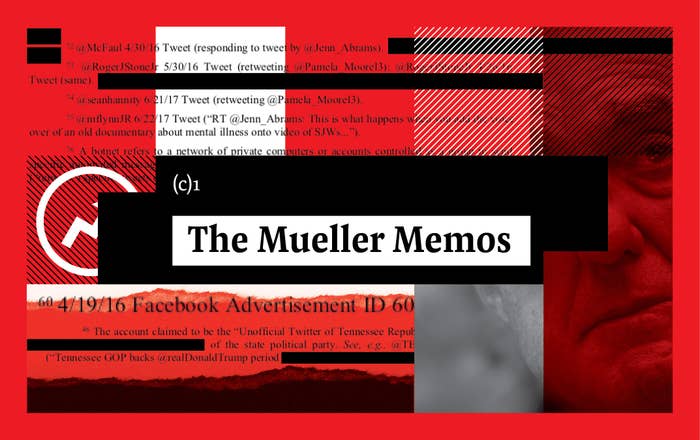
The final batch of summaries of interviews conducted for former special counsel Robert Mueller's two-year criminal investigation into the 2016 election has been released by the government six weeks before President Donald Trump is set to leave office.
Over the past 13 months, the Justice Department has turned over thousands of pages of FBI records to BuzzFeed News and CNN in response to lawsuits filed under the Freedom of Information Act. The documents have shown what hundreds of people told the special counsel’s office during its inquiry into Russian interference in the presidential election and Trump’s alleged attempts to obstruct justice.
More than 5,000 pages of these witness interview summaries, known in FBI jargon as 302s, have been released since November of last year. Those documents are excerpted throughout the special counsel’s final 448-page report, which was released in April 2019. But many details have never before been revealed to the public, such as assertions by Michael Cohen, Trump's former personal attorney, that it was “not his idea” to write a statement to Congress that contained lies about the Trump Tower Moscow project. Or that Treasury Secretary Steve Mnuchin personally organized a last-minute $10 million loan to the 2016 Trump campaign from the candidate himself.
On Tuesday, the government turned over 41 heavily redacted pages that included summaries of interviews with Republican operative Aaron Nevins, Bill Priestap, the former assistant director of the FBI's Counterintelligence Division, and Edward Gistaro, the deputy director of national intelligence for intelligence integration. Gistaro's entire interview summary was redacted.
In shielding much of the information in the documents, the government cited exemptions under the Freedom of Information Act that protect ongoing investigations, trade secrets, financial information, and the identity of a confidential source. The names of multiple individuals who spoke to Mueller's team were withheld on privacy grounds, such as an FBI employee detailed to the White House National Security Council.
With this latest round of documents, the Justice Department’s production of 302s is complete and comes to a close. The government is still obliged by court order to turn over other related documents, including emails, letters, and memos, which were gathered as part of the probe, along with FBI agents' handwritten notes. Those are expected to be released on a rolling basis beginning early next year.
Mueller’s report was the most hotly anticipated prosecutorial document in a generation. To date, the investigation has resulted in the indictments of 37 individuals as well as seven criminal convictions; it has also helped spark numerous other criminal investigations.
Despite that record, Trump has consistently tried to discredit the work of the special counsel, which he has frequently dismissed as a “witch hunt,” and excoriated Mueller and prosecutors, declaring them to be "angry Democrats." (Mueller is a registered Republican.) Trump found significant support in that effort from his attorney general, Bill Barr, who overlooked major findings of the probe when he announced its conclusion in March 2019. On several occasions, Barr has taken the extremely unusual step of intervening in cases related to the probe, among them the prosecutions of consultant Roger Stone and former national security adviser Michael Flynn. Last week, Trump pardoned Flynn; in July, he commuted Stone's prison sentence.
Barr also tapped a US attorney in Connecticut, John Durham, to probe the origins of the Russia inquiry, which began in June 2016. He has already charged an FBI lawyer with doctoring a document used to secure a wiretap. That attorney pleaded guilty in August. On Tuesday, Barr notified the House and Senate Judiciary Committees that on October 19 he appointed Durham to the role of special counsel, with the intention that he is shielded from being fired while he continues his investigation under a Biden administration.
BuzzFeed News has separately been pursuing other Freedom of Information Act lawsuits related to the special counsel office’s activities, obliging the government to release a significant volume of other documents. Production of those materials, which could take years, will ensure that details of the investigation that dogged much of Trump’s presidency will continue to be laid bare long after he leaves office.
One of those suits, filed in conjunction with the Electronic Privacy Information Center, an advocacy group, resulted in the release of dozens of previously redacted pages of the final Mueller report itself. Among other revelations, those sections revealed that federal prosecutors investigated Julian Assange, WikiLeaks, and Stone for abetting the hacking of Democratic National Committee servers as well as for possible campaign finance violations, but ultimately chose not to charge them due to a lack of evidence.
